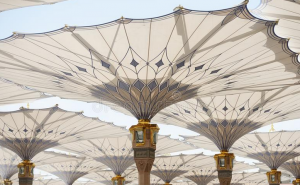Hadhrat Maulana Rashid Ahmad Gangohi (rahmatullah alayh)-P4
![]()
Miscellaneous Anecdotes
1) A man came with the intention of bay’t. Hadhrat said:
“Tell me, will you make taubah or be a faqir?”
He replied: “I am not making taubah. I shall become a faqir.” Hadhrat said:
“If you will make taubah, I shall assist you in it. But, I myself am not a faqir, how can I make you a faqir?”
The man responded:
“Then I shall go to someone else.”
2) Once Hadhrat Maulana Muhammad Yaqْb, the son of Hadhrat Maulana Mamlْk Ali (Hadhrat’s Ustaad) came to Gangoh. Asr Jamaat was ready to begin. Hadhrat Gangohi beckoned to Maulana Yaqْb to lead the Namaaz. When Maulana began walking to the Musalla, Hadhrat Gangohi started to wipe with his shawl the dust and sand which had collected on the feet of Maulana Yaqْb who had walked on foot to Gangoh. Maulana remained standing silently allowing Maulana Gangohi to clean his feet.
3) A certain man had annoyed and hurt the feelings of Hadhrat Imaam Rabbani. Hadhrat Maulana Khalil Ahmad fearing the possibility of Hadhrat cursing the man, said:
“Hadhrat, please do not curse him.”
Hadhrat Gangohi was overcome with fear and said:
“Taubah! Taubah! Does one ever curse a Muslim? Astagfirullah!”
4) Hadhrat said:
“If in one gathering all the Auliya have gathered including Hadhrat Junaid Baghdadi and our Hadhrat Haji Sahib also happens to be there, then we shall not turn our attention to Hadhrat Junaid Baghdadi or anyone else. We will go to Hadhrat Haji Sahib. Yes, Hadhrat Haji Sahib should turn his attention to them. Our concern is with only Hadhrat Haji Sahib.”
5) In Ambheta was a man by the name, Munshi Tajammul Husain. He was a mureed of Hadhrat Haji Sahib. He used to meet often with dervishes, going hither and thither. Once his wife complained about him to Hadhrat Gangohi who asked him for an explanation. He said:
“Undoubtedly, no one is as perfect as our Hadhrat. By the fadhl of Allah, everything is found. However, I desire that my heart begins to vibrate, hence I wander hither and thither.”
Hadhrat Gangohi said: “What is there in it?”
Munshi Husain said: “I am fully aware that in it (i.e. in this condition) there is nothing. But, what can I do? My heart yearns for it.”
Hadhrat said: “Now go and sit in the Musjid.”
He complied with the instruction. Hadhrat made wudhu and walked towards the Musjid. As Munshi Husain heard the sound of Hadhrat’s clogs, his heart flared into operation (i.e. into continuous thikr).
(The word clogs has been used for lack of an English term for the wooden sandals used for wudhu. – Translator).
Munshi Husain ran and fell at Hadhrat’s feet and said: “I have gained what I had desired. Now I shall no longer search for anyone.” Thereafter he abandoned his restless wanderings.
6) Once Qadhi Ismail Manglori said to Hadhrat Gangohi:
“Hadhrat, occasionally do focus tawajjuh on the Taalibeen (Searchers of Allah’s Proximity).”
Hadhrat responded:
“Why should I perform like yogis?”
Qadhi Ismail was surprised by this answer which had likened the practice of the Masha-ikh to the act of yogis. Thereafter at the Jalsah in Deoband, Hadhrat Gangohi delivered a wa’z (lecture). Qadhi Ismail was also present. The effect of Hadhrat’s lecture was profound on the assembly. People cried and sobbed. Some swooned and fainted. After the wa’z, Qadhi Ismail approached Hadhrat Gangohi and exclaimed:
“Yes, Molvi Sahib, occasionally you should do so.”
Hadhrat said: “What have I done? I have done nothing.”
7) A simple villager came to Hadhrat at a time when the khuddaam were pressing his body, and said:
“Molvi, you must be very happy to have people serving you.”
Hadhrat said: “Brother, I do feel pleased because of the comfort. But, Al-hamdulillah! There is no pride in the heart. I do not think of myself to be superior to those who are serving me.”
Hearing this answer the villager said:
“Then there is nothing wrong in taking service?”
8) Once during Hajj, Imaam Rabbani was wearing a kurtah of fine muslin while making tawaaf. In the mataaf (Tawaaf area) was sitting a blind buzrug who uttered ‘خشّن خشّن’* when Hadhrat passed by him during the shaut (Tawaaf circuit). On account of Hadhrat’s absorption, he did not near the buzrug’s comments. When Hadhrat passed by the buzrug in the second shaut, he repeated the same word. Now Hadhrat clearly heard him and was convinced he was being addressed. Hadhrat therefore, looked at him. The buzrug said:
“Wear the garments of the Saaliheen.”
Hadhrat pointed at his kurtah and said:
“This too is the garment of the Saaliheen.”
The buzrug said: “No! No! (The garments of the Saaliheen are) thick and coarse.”
Imaam Rabbani saying: “Very good. Allah give you barkat.”,
continued with his tawaaf.
9) Once Hadhrat came outside after performing Ishraaq Namaaz. Contrary to his normal practise, he covered his face with his shawl and laid down. A day before, a wedding party had arrived from Karnaal. In the party was also a female dancer. Several persons in the group had an acquaintance with Hadhrat. They came to greet him, but found him sleeping with his head covered. Although they sat waiting for a long while, Hadhrat did not open his face. Finally, one of them said:
“Hadhrat! We have come to see you.”
Hadhrat while keeping his face covered responded with anger and grief:
“What benefit is loaded in seeing me?”
Ultimately, an old man in the party understood that it was on account of the dancer that they were being deprived of Hadhrat’s ziyaarat. Apologising, he said:
“Hadhrat, we did not bring the dancer. The girl’s party is responsible for this.”
Hadhrat spontaneously said:
“The girl’s party is not anyone’s god to be obeyed.”
Many of those present were profoundly affected by this reply. After these people left, Hadhrat opened his face and sat up.
10) The urs of Shah Abdul Quddْs (Hadhrat’s grandfather) greatly pained Hadhrat Gangohi. But, he was unable to put a stop to it. The grief caused to him by this urs made tolerance extremely difficult for him. This was a supreme mujaahadah for him. In the beginning Hadhrat would leave Gangoh during the urs days and go to Raampْr. Later he remained in the khanqah suffering tremendous pain. He would become angry with any of his relatives who attended, and refrained from speaking with them.
Once Maulana Muhammad Salih Jalandhai who is Imaam Rabbani’s khalifah, in his enthusiasm for meeting Hadhrat, came to Gangoh. Coincidentally, it was the time for the urs. When he arrived Hadhrat did not entertain him. Besides replying to his Salaam, Hadhrat said nothing else, neither enquiring about the food arrangements of Maulana Salih. Hadhrat was absolutely cold towards him. Only Maulana Salih knew what torture he had to endure from this cold treatment. He tried his best to figure out the reason for Hadhrat’s attitude, but could not arrive at any conclusion. He would come to Hadhrat, sit silently and sorrowfully and return. Finally, unable to bear it any longer, he came crying to Hadhrat and implored:
“Hadhrat, what is the crime for which I am being punished? I am unable to bear it. For Allah’s sake forgive me.”
Hadhrat took his hand and said:
“It is not a crime against me that I can forgive. The crime is against Allah. Seek His forgiveness.”
Maulana Salih then understood the reason. He had come to Gangoh during the days of the urs, which was detestable to Hadhrat. Maulana Salih then said by way of apology:
“Hadhrat, Allah is witness. From the very beginning I had no liking for urs, etc. Wallah! I did not come to Gangoh with the idea of urs nor was I aware of the urs taking place here nowadays.”
Hadhrat Imaam Rabbani said:
“Although it was not your intention to participate in the urs, but on the road where two persons who were coming to the urs. You were the third. Rasulullah (صلى الله عايه وسالم) said:
‘Whoever augments the gathering of a community, he is of them.’ ”
11) Once Hadhrat went to Deoband’s Jalsah of Dastarbandi (the turban-tying ceremony for final year students). One day at Asr time, Maulana Muhammad Yaqْb went forward to lead the Salaat. On account of the huge crowd and abundance of musaafahah (hand-shaking), when Hadhrat Gangohi joined the Jamaat, the Qiraat had already commenced despite Hadhrat’s haste in joining. After the Salaam it could be seen from his expression that Hadhrat was dejected. Sorrowfully he said:
“Alas! After twenty two years, today I missed Takbir-e-عla.”
12) Once a blind man came to the khanqah and with considerable emphasis expressed his sincerity and eagerness for meeting Hadhrat. He said that he had come walking from Meerat for the sole purpose of learning the Name of Allah. The inmates of the khaanqah were immensely impressed by his claims. They were very hospitable towards him.
When Athaan was called and Hadhrat came to the Musjid, the blind man offered his hand for musaafahah. Hadhrat rebuffed and completely ignored him. Inspite of him professing his yearning and his long desire for meeting Hadhrat, he was ignored. Hadhrat did not pay any attention to him. Those who had heard the statements of the blind man who had expressed so much love for Hadhrat, were surprised by the reaction of Hadhrat Gangohi. But no one had the courage to say anything. A sincere associate interceding on behalf of the blind man said:
“Hadhrat, the blind man is extremely worried.”
Hadhrat even disliked this intercession and said angrily:
“When something is not of your concern, why do you speak? Look at his heart. It is filled with the world.”
Thereafter, no one had the courage to say anything further. Finally, the blind man left. Later he was seen participating in qawwaali, feigning states of ecstasy.
Sufi Karam Husain who had witnessed this episode from the beginning and was surprised at Hadhrat’s attitude, was stunned by this development. He asked the blind man:
“What has happened to the love and yearning for Hadhrat?”
At least he was honest. He said:
“Brother, I had thought of creating an impression on your elder so that I could be accommodated for a few days until the time of the urs. In fact, there was neither yearning nor any love. I am a wanderer spending my time in this way.”
13) Hadhrat said:
“Nisbat means nearness to Allah. No one can snatch it away. How can anyone snatch something bestowed by Allah?”
14) People would come to Hadhrat Rabbani and along with telling him about their circumstances, they would complain about others. Hadhrat would very calmly give them a hearing. Once Hadhrat Maulana Muhammad Yahya asked:
“People narrate their complaints to Hadhrat. Does it not affect Hadhrat?”
Hadhrat Gangohi said:
“I understand that there is some ill-feeling towards the other party. As long as I have not heard the other side, how can I accept (the complaint to be correct)?”
15) In the days of his youth, Hadhrat Imaam Rabbani had written an article on the reality of Tariqat. It is reproduced hereunder.
“The knowledge of the Sufiyyah means the knowledge of the zaahir and baatin of the Deen and of the power of Yaqeen. This is the loftiest knowledge.
The reality of Tasawwuf is adornment with the attributes of Allah Ta’ala, the elimination of one’s will and total engrossment in the pleasure of Allah Ta’ala. The character of the Sufiyyah is in fact the character of Rasulullah (صلى الله عايه وسالم) as stated by Allah Ta’ala:
“Most certainly, you (O Muhammad!) have been created on a great character.”
Further, whatever has been stated in the Ahaadith is executed within the scope of the characters of the Sufiyyah. The list of the akhlaaq (attributes and characteristics) of the Sufiyyah is as follows:
1. To believe oneself to be the most inferior. Its opposite is takabbur (pride).
2. Kindness to creation and to tolerate the difficulties and inconveniences they cause one.
3. Tenderness and cheerfulness and to abandon anger.
4. Sympathy for others and to give preference to them. This implies priority to the rights of others over one’s pleasures.
5. To be generous.
6. To overlook the wrongs of others and to forgive them.
7. To abstain from pretence.
8. To spend in moderation, without being miserly or wasteful.
9. To have trust in Allah.
10. To be contented with little worldly possessions.
11. To adopt piety.
12. To refrain from arguing, quarrelling and being wrathful except for the truth.
13. To abstain from malice and envy.
14. To abstain from the desire of respect and fame.
15. To fulfil promises.
16. To be tolerant, far-sighted and supportive of brothers.
17. Gratitude to the benefactor.
18. To sacrifice reputation for the sake of Muslims.
The Sufi in regard to akhlaaq adorns his zaahir and his baatin. The whole of Tasawwuf is in fact Adab (respect). The adab of the Divine Court is to shun everything besides Allah Ta’ala on account of shame for Allah’s splendour and grandeur.
The worst sin is to converse with the nafs, for it is the cause of spiritual blindness.”
16) Once Maulana Wilayat Husain asked:
“It is said that shaitaan cannot appear in the form of one’s Shaikh. Is this correct?”
Hadhrat Gangohi said:
“Yes, if the mureed has acquired Tauhid-e-Matlab which means that the mureed’s faith in his Shaikh is so grounded that he believes no one else besides his Shaikh in the whole world to be his medium of hidaayat.”
17) Hadhrat said:
“The faces of those who insult and vilify the Ulama turn away from the Qiblah in the grave. Whoever wishes can ascertain this.”
18) “Since the Ghair Muqallideen vilify the Aimmah-e-Deen, performing Salaat behind them is Makrooh.”
19) One day Maulana Muhammad Hasan asked:
“Is it permissible to give a bayaan (lecture) on the birth of Rasulullah (صلى الله عايه وسالم), reading from a kitaab and without observing the prevalent customs (associated with moulood)?”
Hadhrat said:
“What wrong is there in it?”
Thereafter Hadhrat added:
“Pirzaada Sultan Jahan sent a message:
‘Read that Moulood which is permissible and show us.’ ”
Such a moulood was arranged in a house. Hadhrat continues:
“I sent Molvi Khalil Ahmad with the kitaab Taareekh-e-Habibe Ilaah, the author of which is Mufti Inayat Sahib. I told him to recite from the kitaab. He first recited the aayat,
لقَدْ جاءَ كُمْ الرسول … (Verily, the Rasool has come to you…). Then he gave a bayaan on this aayat and narrated the statements and actions of Hadhrat Shaikh Abdul Quddْs. Then he discussed the customary acts of bid’ah prevalent. He fully exposed the artificial sufis of the time. Then he recited from the kitaab historical events pertaining to Rasulullah’s birth, etc., and then closed the talk. (This was the end of the moulood).
Although many people were annoyed with the owner of the house for having called Maulana for this moulood, there resulted much out if it. Many people are under the impression that the refuters of moulood reject the very idea of discussing the birth (moulood) of Rasulullah (صلى الله عايه وسالم). Many people became convinced of their error.”
20) Hadhrat said:
“If Allah Ta’ala eliminates pride from the heart,, everything has been gained.”



